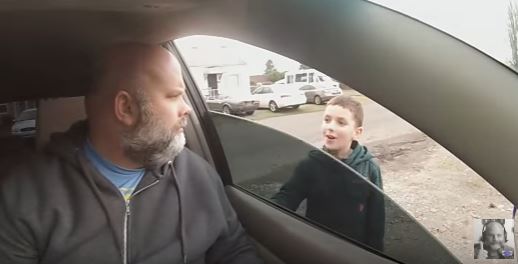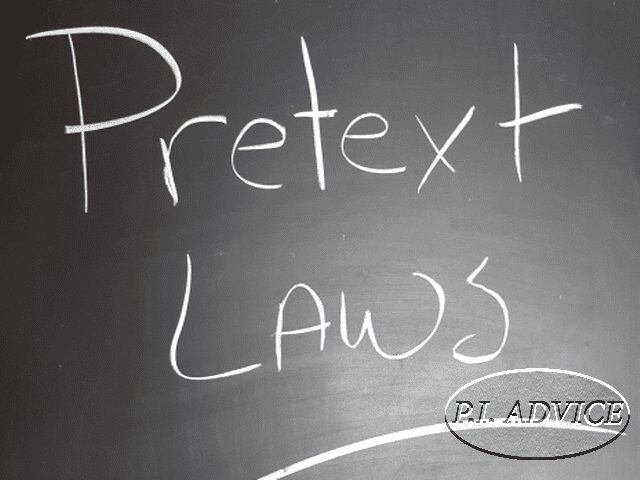Contents
- 1 Introduction to Pretexing and Pretexting Laws for Investigators
- 2 The Definition of a Pretext
- 3 What is the Objective of a Pretext?
- 4 How I Have Used Pretexting in the Past
- 5 Pretexting Neighbors
- 6 In-Person Pretexting a Subject For Information
- 7 Phone Pretexting
- 8 Pretext Laws and Case Law
- 9 Numerous Pretexing Laws Regarding Impersonating a Law Enforcement Officer
- 10 Pretext Law Associated to a Represented Individual
- 11 Rule 4.2: Communication with Person Represented by Counsel
- 12 It is Illegal to Pretext for Financial Information
- 13 It is Illegal to Pretext to Determine Insurance Transactions
- 14 It is Illegal to Pretext in the state of Minnesota in Connection with an Insurance Claim
- 15 Court Cases Involving Pretexting
- 16 Chicago Company Liable for Investigator’s Pretexting Information
- 17 Definition of Intrusion Upon Seclusion
- 18 Definition of Tort
- 19 Uber Collects Information on Those Suing Them Using Private Investigators
- 20 Hewlett Packard Pretexting Scandal
- 21 What Happened With Hewlett Packard and Pretexting?
- 22 Pretexting Laws And How it Affects Private Investigators
Introduction to Pretexing and Pretexting Laws for Investigators
If you are a private investigator then it is very important that you become very familiar with pretext laws and laws associated with conducting a pretext. This article will help you in a variety of situations and help keep what you are doing in the field to be legal. Being an ignorant investigator does not make you innocent if you do something illegal. We will get into what a pretext is, the objectives of a pretext, how I have used pretexting in the past, and then we will discuss laws surrounding pretexting and some case law information. Feel free to scan the article to find the areas that are of most interest to you.
The Definition of a Pretext
The core word of pretexting is the word pretext, and various dictionaries provide an accurate definition of the word. The definition of pretexting is the act of saying or doing something to disguise someone’s true intentions. If you Google search “What is Pretexting” you will find definitions from websites that have never likely performed a pretext and only associate the definition of pretexting with malicious behavior. Pretexting, for the most part, is not done to be malicious in the world of investigating. Pretexting is designed to provide a story that helps an investigator continue with an investigation or to misdirect so an investigation can continue. In this article, I will discuss numerous topics relating to pretexting laws, how I have used pretexting, and court case examples relating to pretexting.
I basically put pretexting into two categories:
- Pretexting to gain information
- Pretexting to justify a person’s presence somewhere
What is the Objective of a Pretext?
The objective of a pretext is to uncover information from a person without the person knowing the true reason for the answer they give to the person pretexting. As you read on, I will give some examples of how private investigators view pretexting and
Whenever someone is using or creating a pretext they need to think about the objective of the pretext and the information they are trying to learn. Then the pretext should be crafted around what is trying to be learned. Defining the objective is very important for a pretext to have a chance of success for investigators.
If a private investigator wanted to find out if someone has a dog they would craft their pretext around something that would trigger someone to reveal they had a dog. An investigator might call the person and perform a dog food survey and through that survey, they will ask how many dogs the person has, what types of dogs they have, or if they are indoor or outdoor dogs. They would also prepare for questions that the person might ask me in return to reinforce the legitimacy of the pretext.
How I Have Used Pretexting in the Past
Pretexting doesn’t have to be elaborate or complicated. Pretexing can be complex and some can be very simple. It should be something that is practiced so that the investigator pretexting feels comfortable and is prepared for conversations. Below are some of the ways I have used pretexting in the past.

Pretexting Neighbors
Pretexting neighbors in a neighborhood will happen from time to time during surveillance. If neighbors approach a surveillance investigator’s vehicle asking the investigator why they are parked in a particular location, a private investigator may provide that neighbor with a pretext to justify their (the investigator’s) presence there. Ideally, the neighbor believes the investigator’s pretext and is not alarmed that the investigator is parked in the area.
Sometimes investigators pretext neighbors for information about the subject of the surveillance. Through pretexting, an investigator will try to find out who lives in the home, what vehicles the individual drives, if the subject works or when the subject of the investigation is typically home. Sometimes with the right pretext and right neighbor, an abundance of information can be obtained.
In-Person Pretexting a Subject For Information
Pretexting can be done in person to the subject of the investigation to confirm their identity or to learn more general information about them that may assist in the investigation or surveillance. Through the course of a pretext conversation, a subject might talk about their hobbies or interests to the investigator which might be beneficial for surveillance efforts in the future.

Phone Pretexting
Phone pretexting is much like in-person pretexting where the goal can be just to confirm that the subject is home. Sometimes phone pretexting is used to develop where they are living, if they have moved, or just to find someone. With the right type of pretext, other information can be developed to help with future surveillance efforts.
Pretext Laws and Case Law
Numerous Pretexing Laws Regarding Impersonating a Law Enforcement Officer
There are plenty of things a private investigator cannot do and one of those things is impersonating a police officer. A private investigator should also never impersonate a doctor, a real person, or a real business. It’s ok to pretend to be someone you are not, you just have to avoid these key things.
When pretexting be prepared to use fictitious business names and a fake name for yourself. I would even Google the business name you plan on using to make sure it doesn’t exist somewhere.
Pretext Law Associated to a Represented Individual
Rule 4.2: Communication with Person Represented by Counsel
This rule as quoted from the American Bar Association’s website states the following:
In representing a client, a lawyer shall not communicate about the subject of the representation with a person the lawyer knows to be represented by another lawyer in the matter, unless the lawyer has the consent of the other lawyer or is authorized to do so by law or a court order.
Simply put, a lawyer can not talk to the client of another attorney involving the same case without permission from that attorney. If a private investigator is working for an attorney they are considered an extension of the attorney and the same rules apply.
This rule is important for pretexting as well. If a private investigator conducts a pretext to a represented subject, there is a chance the subject may discuss something related to his case or claim. This would be in violation of this rule. As private investigators, we are extensions of attorneys and can be accountable as a result.
Many investigators are taught that as long as the subject doesn’t discuss their claim (in insurance matters) that it is ok to make contact with a subject. Investigators should avoid contact with a represented subject so as to not appear to have violated this rule.
Many clients now restrict pretexting altogether to avoid any chance of trouble with this rule happening. And in my opinion, I think that is the best solution.
It is Illegal to Pretext for Financial Information
The Gramm-Leach-Bliley Act (GLBA), enacted in 1999, prohibits anyone from securing customer information from financial institutions (banks, credit card companies, or credit reporting agencies under false pretenses (lying or pretexting). If a private investigator attempts to do this they will be committing a crime.
It is Illegal to Pretext to Determine Insurance Transactions
Many states have adopted portions of the entire Insurance Information and Privacy Protection Model Act created by the National Association of Insurance Commissioners (NAIC).
In Section 3 specifies Pretext Interviews and states the following,
No insurance institution, agent or insurance support organization shall use or authorize the use of pretext interviews to obtain information in connection with an insurance transaction; provided, however, a pretext interview may be undertaken to obtain information from a person or institution that does not have a generally or statutorily recognized privileged relationship with the person about whom the information relates for the purpose of investigating a claim where, based upon specific information available for review by the Commissioner, there is a reasonable basis for suspecting criminal activity, fraud, material misrepresentation or material nondisclosure in connection with the claim.
With that being said at the end of this section it indicates that there may be some consideration in cases of suspected criminal activity, fraud, material misrepresentation or material nondisclosure in connection with the claim.
It is Illegal to Pretext in the state of Minnesota in Connection with an Insurance Claim
I have never worked in Minnesota but I have heard this from more than one investigator and it is confirmed here.
In the law it states the following:
Sec. 5. [72A.493] [OBTAINING INFORMATION BY IMPROPER
MEANS.]
An insurer, insurance agent, or insurance support organization must not obtain information or authorize another person to obtain information in connection with an insurance transaction by:
- pretending to be someone he or she is not;
- pretending to represent a person he or she is not in
fact representing; - misrepresenting the true purpose of the interview; or
refusing to identify himself or herself upon request.

Court Cases Involving Pretexting
There are many court cases associated with pretexting. I found pretexting court cases that were relatable to private investigators to show some of the things you might want to avoid doing as a private investigator and the outcome of those court cases.
I also included some more public court cases associated with pretexting.
Chicago Company Liable for Investigator’s Pretexting Information
In this specific case, an employee left the company North American as a commission-based salesperson and began working for a competitor. North American opened up an investigation to determine if the employee had breached the non-compete agreement that she had agreed to while employed with North American. North American hired an attorney to help with the investigation and the attorney hired a private investigation firm.
North American provided the investigation company with the usual information like date of birth, name, address, phone number, and social security number.
The private investigation firm then hired a subcontractor to obtain phone records without the permission of the employee.
The sub-contract investigation company used a pretext with the phone company using the information provided by North American to get the employee’s phone records. Essentially the company pretended to be the employee when contacting the phone company.
The employee didn’t even know that this had taken place until after she had filed a lawsuit regarding the commission that hadn’t been paid to her and the enforceability of the non-compete agreement. After she found out about the phone records being given to North American the employee added a claim for intrusion upon seclusion.
Here are some quick definitions.
Definition of Intrusion Upon Seclusion
Intrusion upon seclusion is defined by Duhaime’s Law Dictionary as, A privacy tort; intentionally intruding upon the seclusion or private affairs or concerns of another if the intrusion would be highly offensive to a reasonable person.“
Definition of Tort
And a “Tort” is a wrongful act or infringement of a right (not including breaches of contract or trust) that damages a person’s credibility, property, or anything similar which entitles the injured party to compensation of some sort.
The employee was eventually awarded $65,000 in compensatory damages and $1.75 million in punitive damages. The punitive damages were later reduced by The Supreme Court.
North American tried to say that there was not enough evidence to support a relationship between themselves and the investigators however the court concluded that North American knew the employee’s phone records were not publically available. By providing the employee’s information to the investigator and requesting phone records, there was a clear relationship between the two parties.
Basically, the case of Lawlor v. North American Corp. of Illinois, No. 2012 IL 112530 (Oct. 18, 2012), provides case law that holds a company liable when hiring investigators independent of a company for the actions they take. So just because the investigator isn’t an employee of the company doesn’t mean a company can wash its hands of any overzealous or illegal activity an investigator is doing.
On that same note, if you are a private investigator working for a company you should not be doing something illegal just because a superior asked you to do it. And if they ask you to do something that might be in a legal gray area, have them request you to do that thing in writing. For me personally, my financial stability does not hinge on one company and if a company asks me to do something I don’t think is ethical, legal or safe, I tell them politely no and offer some other solutions.

Uber Collects Information on Those Suing Them Using Private Investigators
Uber seems to be doing less shady things nowadays since getting rid of their founder and CEO Travis Kalanick. But when Mr. Kalanick was running the show there seemed to be one bad thing after another with UBER.
In the case of Meyer v. Kalanick, an Uber customer Spencer Meyer in the suit alleges that” Uber has a simple but illegal business plan: to fix prices among competitors and take a cut of the profits.” The lawsuit cited violations of the Sherman Act, a 1890 law that encourages competition in a competitive free market.
After the suit was filed Uber decided to learn more about Mr. Meyer and his attorney and hired Ergo (a private investigation company). Ergo then called many of the attorney’s colleges under a pretext indicating they were essentially collecting information about an up-and-coming labor lawyer to gain more information about the plaintiff’s lawyer.
Uber was contacted by Meyer’s attorney but they stated they were not involved with the pretexting of his colleagues.
Only when Meyer’s attorney was about to make an application to the court did Uber’s lawyers admit to what took place regarding the pretexting of his colleagues.
The judge wrote,
“As is obvious from the above brief summary, there is a strong suggestion that, at a minimum, an Ergo investigator hired by Uber in connection with this case made false representations in order to gain access to information about plaintiff and his counsel, thus raising a serious risk of perverting the processes,”
This made Uber look less than truthful. Uber tried to state that the investigation company conducted those pretexts on their own with no guidance. Many companies try to distance themselves from liability and Uber was no different.
This case is still in litigation but here is the most recent summary of what has taken place.
Hewlett Packard Pretexting Scandal
At the time this took place I don’t think I paid any attention to this pretexting incident with private investigators working for Hewlett Packard.
There have been many articles written about what took place but I will provide a summary of what happened and link to other articles for further reading.
What Happened With Hewlett Packard and Pretexting?
Much of what I have read reveals a very negative culture at HP leading up to the incident involving private investigators and pretexting.
In 2006 news sources revealed that Patricia Dunn, the HP chairwoman hired an outside law firm to conduct interviews with directors to find out who was leaking company information. After they completed their interviews they had not determined who the leak was.
A company that had worked for HP in the past, Security Outsourcing Solutions, Inc lead by Ronald DeLia, and two private investigators known as data brokers were hired. Data brokers at that time were those who secured and sold telephone records without the consent of those who owned the records. These investigators were asked to get phone records of employees, journalists, and some individuals on the Board of Directors. Dunn provided the investigators with the phone numbers that she wanted records of.
Dunn eventually outed the leak as director George Keyworth during a board meeting in 2006. He was asked to resign but Keyworth would not. Another board member Mr. Perkins did resign as a result of the whole matter because of how it all played out.
Because of this resignation and the matter of HP not disclosing to the SEC (by law they should have) why Perkins resigned, Perkins, with knowledge of how the investigation was conducted, wrote to other directors in public about how the investigation was lead by Dunn using Security Outsourcing Solutions, Inc lead by Ronald DeLia who in turn subcontracted other investigators to pretext AT&T to secure phone records of those targeted. These investigators are identified in the quote below.
The FTC.GOV site stated the following in a press release on May 28, 2008:
According to the FTC complaint, the Telecommunications Act of 1996 provides that a customer’s phone records may only be disclosed “upon affirmative written request by the customer.” But the agency alleged that since at least 2005 Action Research Group, Inc., and its principals, Joseph and Matthew DePantes, sold confidential customer phone records, including lists of calls made and the dates, times, and duration of the calls, to third parties, without the knowledge or consent of the customers. To get the records, these defendants relied upon the other defendants, Eye in the Sky Investigations, Inc., Cassandra Selvage and Bryan Wagner, who obtained them from phone companies through “pretexting” – using “false pretenses, fraudulent statements, fraudulent or stolen documents or other misrepresentations, including posing as an account holder or as an employee” of a phone company. Selling the records constitutes an invasion of privacy that could endanger the health and safety of consumers, the agency alleged.
What was interesting is that there was no federal law against what had taken place. California, however, had strict laws regarding phone records and was the only reason anyone faced any consequences.
A judgment totaling over $600,000 was handed down to the investigators involved to recoup ill-gotten gains. I would recommend reading the press release here.
This incident brought about the Telephone Records and Privacy Protection Act of 2006 which was enacted in 2007. This act provided criminal penalties for someone who secures or distributes phone records without the consent of the individual.
Pretexting Laws And How it Affects Private Investigators
Once in a while, there are investigators that pop in and say they can get information that can only be secured illegally (but they don’t say illegally). When this happens and it is noticed by the investigation community, the community jumps in quickly to remind that investigator (if they really are) that it is illegal to do said thing.
I discuss in a previous article what investigators can and can not do which I recommend taking a look at to make sure you are above board when conducting investigations.
Pretexting is an incredible art form used by investigators and when used in the correct legal way for the right reasons, there is no reason to be concerned about breaking the law.
Due to the lack of information early in my career (no Facebook or vast internet resources), the majority of my pretexting was just to identify that I was conducting surveillance on the right person. The rest of the pretexting was to keep neighbors from bothering me and to gain additional information about individuals I was conducting surveillance on.
Now I feel as though the more pretexting that is conducted during surveillance the more problems it brings to surveillance efforts.
I am sure as time goes on more pretexting laws will be created to protect personal information. But for now, the current laws are a great deterrent from illegal pretexting.
With that being said I hope this article sheds some light on pretexting and pretexting laws.
Andrew
Recent Posts
Hawaii is probably one of the most interesting states to work as a private investigator if you are not used to the culture or a native of the state. And if you are not a local, that is something...
How to become a private investigator in Georgia

